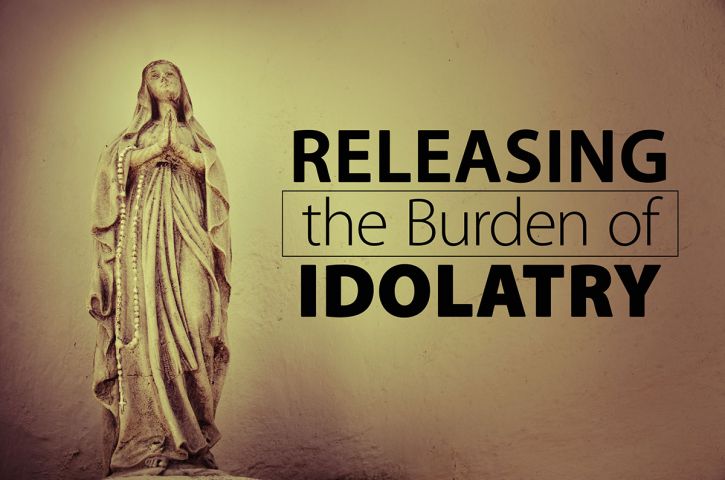Releasing the Burden of Idolatry
For thousands of years people have tried to worship God using statues and images. Why does God condemn idolatry? Is it a challenge for Christians today?

In an experiment by Dr. Thomas Endlein of Cambridge University, the Asian weaver ant was able to hold a 500-milligram weight while hanging upside down. The weight was actually 100 times the ant’s body weight—the equivalent of a person carrying several cars.
According to New Scientist, Olympic champion Andy Bolton lifted 457.5 kilograms (1,008.6 pounds) from the floor to his thigh. This represents the maximum weight a human being is recorded to have lifted. Most of us could not even lift half of that!
But the Bible warns that there is a weight, or a burden, far heavier than this!
The burden of idolatry
The ancient world made gods of wood and stone (Deuteronomy 4:28). When people needed to move them, the idols had to be carried on their animals and, as such, they were burdens that were carried around (Isaiah 46:1). But unlike these false gods, the true God carries us (verse 4).
Though this ancient form of idolatry is still practiced today, modern idolatry can take many other forms. They, too, are burdens you and I may be carrying around in our lives. To learn more about modern forms of idolatry, read “Idolatry—Then and Now.”
Idolatry is not just practiced in pagan religions but is also deeply embedded in the professing Christian world.
God’s challenge to us
Instead of worshipping idols of any kind, we need to be developing a deeper understanding of the true God. We don’t understand Him by trying to draw pictures of Him or envision His appearance in our mind. God said, “To whom will you liken Me, and make Me equal and compare Me, that we should be alike?” (Isaiah 46:5; compare Isaiah 40:18).
The point is that we should not try to understand God by using something physical and made by man. In fact, God made us in His image and likeness (Genesis 1:26). We are not to try to make Him in our likeness!
We are to use the Bible to learn about God by what He says about Himself. The book of Isaiah gives many important descriptions of God for us to learn from:
-
By His great power and wisdom He created all things (Isaiah 40:12, 22, 26; 44:24).
-
He exalts and humbles; He blesses and curses (Isaiah 40:23-24, 29-31; 42:14-15).
-
He never tires (Isaiah 40:28).
-
He foretells the future (Isaiah 42:9; 46:9-10).
-
He alone is our Savior (Isaiah 43:11; 45:21).
-
He alone can remove our sins and choose to forget them (Isaiah 43:25; 44:22).
-
He is our protector (Isaiah 43:13).
-
He is righteous, declaring what is right (Isaiah 45:19-22).
Image vs. word
God chose to reveal Himself to us by His words instead of an image. He clearly commands us not to make images to worship or understand Him (Deuteronomy 4:12-19).
But what’s the big deal? you may ask. What is the harm? Is there something else we may not be seeing?
God spoke the 10 Commandments (Exodus 20:1) and then presented Israel a written copy on stone (Exodus 24:12). When Moses went up Mount Sinai to get the stone tablets, the Israelites reverted to what they knew from Egypt: idolatry (Exodus 32:8).
So why did God reveal Himself by written words? Why doesn’t the Bible have pictures?
Here’s one idea to consider. When we were born, we entered the world with nothing (1 Timothy 6:7). Our five senses allowed us to learn all that we know today, starting especially with images. Understanding images comes naturally. But the written word takes us to a different level of symbolic learning. No one is born with the ability to read, so the written word requires deeper involvement of our minds.
Release the burden of idolatry
God shows the foolishness of idolatry. Idols cannot proclaim the future—or do anything at all, for that matter, either good or evil (Isaiah 41:23). God calls them “nothing” and “wind and confusion” (Isaiah 41:29). The worship of the creation over the Creator is a universal human problem (Romans 1:25). Idolatry is not just practiced in pagan religions but is deeply embedded in the professing Christian world through crosses, crucifixes, statues and pictures claiming to portray God, Jesus, angels, Mary and saints.
But none of these things accurately portray the being they claim to represent. Instead, they are actually a burden that drags us down spiritually! That burden puts wrong images into our minds. Christians should seek to understand God the Father, Jesus Christ and other biblical figures by reading what God has revealed in the Bible.
Life, Hope & Truth seeks to help our readers leave idolatry behind and embrace biblical truth. Read “The Practical and Priceless Benefits of Bible Study” to learn more about how to learn more from the Bible!
Date Posted: February 27, 2015

 by Isaac Khalil
by Isaac Khalil

